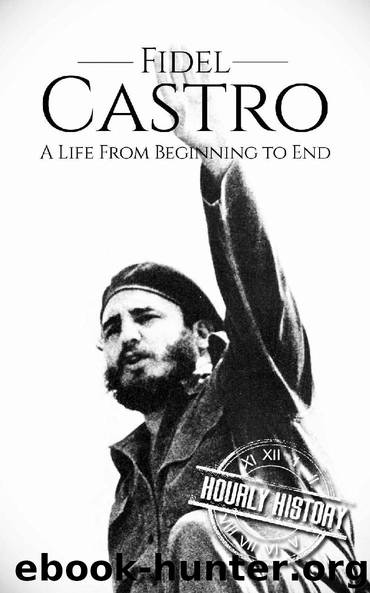Fidel Castro: A Life From Beginning to End (Revolutionaries Book 3) by Hourly History

Author:Hourly History [History, Hourly]
Language: eng
Format: epub, azw3
Publisher: Hourly History
Published: 2017-09-26T05:00:00+00:00
Chapter Seven
The Cuban Missile Crisis
“A revolution is not a bed of roses.”
—Fidel Castro
The United States first became aware of the nuclear missiles that had been placed in Cuba on October 14, 1962, when a U2 surveillance plane managed to snap several photos of the missile sites. Contrary to popular belief, Fidel was rather hesitant to receive these weapons and cannot be directly blamed as the instigator of what would become the Cuban Missile Crisis.
It was only at the insistence of the Soviet Leader Nikita Khrushchev that Fidel Castro accepted the missiles. Apparently, in his constant mental games with the West, Khrushchev had determined that the young Kennedy didn’t have the resolve of Eisenhower and was way too sensible to wage thermonuclear war over a few measly missiles.
Khrushchev was testing the new American administration and believed he had called Kennedy’s bluff. Meanwhile, he believed, that by Cuba having these powerful weapons in their possession, it would ensure that the United States would be discouraged from launching any further invasions.
Upon agreeing to receive the weapons, Fidel wanted to announce Cuba's possession of them to the world. He didn’t want it to seem like some clandestine secret, but to openly declare their existence as a deterrent against future aggression. Khrushchev quickly shot down this idea, however, citing that since 1962 was an election year in the United States, it would be better to wait until after the mid-terms were over so that the Americans wouldn’t think that Russia was trying to somehow tamper with the elections, with sudden bombastic headlines of nuclear deployment.
Regardless of the Russian leader’s apparent sensitivity toward unduly affecting U.S. political candidates, after the photos of the U2 spy plane had been developed, Kennedy went ahead and made the announcement himself on October 22, 1962. When he addressed the American people on live television to inform them that Cuba had nuclear missiles, he proclaimed that any launch of those missiles from Cuba would be viewed to be the result of orders coming out of Moscow, and Russia would be held accountable for it.
Kennedy vowed that if Castro attacked the United States, a nuclear inferno would be unleashed on the Soviet Union as a consequence of Russia’s involvement. This strong statement proved Khrushchev’s assessment of JFK to be completely off base, and not only was the United States posturing as if they were not deterred by the missiles, but the Kennedy administration was also vowing to strike Russia if Castro ever pushed the button to launch his missiles.
With their assessment completely falling apart at the seams, the Moscow Kremlin soon began to panic, ushering in what would be the Cuban Missile Crisis between the two Cold War powers. Strangely, as the Russians panicked, Fidel and his associates became more relaxed. And seemingly emboldened by the fact that their new weapons were now known and out in the open, Fidel began openly suggesting that he would actually use them.
It seems far-fetched that Khrushchev would give Fidel missiles and then become panicked when Fidel talked about using them, but that is basically what happened.
Download
Fidel Castro: A Life From Beginning to End (Revolutionaries Book 3) by Hourly History.azw3
This site does not store any files on its server. We only index and link to content provided by other sites. Please contact the content providers to delete copyright contents if any and email us, we'll remove relevant links or contents immediately.
A Warning by Anonymous(1122)
Benjamin Franklin : an American Life by Walter Isaacson(1018)
Stalin: A Biography by Robert Service(991)
Our Revolution by Bernie Sanders(941)
Fortitude by Dan Crenshaw(936)
Agent 110 by Scott Miller(840)
To Save Everything, Click Here by Evgeny Morozov(817)
Cromwell, Our Chief Of Men by Fraser Antonia(815)
Eichmann in Jerusalem by Hannah Arendt(814)
Dark Mirror by Barton Gellman(789)
Letters from a Stoic (Classics) by Seneca(787)
Che Guevara: A Revolutionary Life by Jon Lee Anderson(777)
The Path to Power by Robert A. Caro(729)
Hadrian and the Triumph of Rome by Everitt Anthony(724)
War for Eternity by Benjamin R. Teitelbaum(716)
The Room Where It Happened by John Bolton(700)
The Long Walk to Freedom by Nelson Mandela(686)
His Day Is Done: A Nelson Mandela Tribute by Maya Angelou(671)
1250112508 (N) by Eric Bolling(647)
